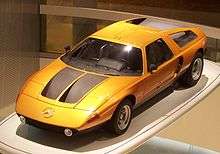Mercedes-Benz C111



The Mercedes-Benz C111 was a series of experimental automobiles produced by Mercedes-Benz in the 1960s and 1970s. The company was experimenting with new engine technologies, including Wankel engines, diesel engines, and turbochargers, and used the basic C111 platform as a testbed. Other experimental features included multi-link rear suspension, gull-wing doors and a luxurious interior with leather trim and air conditioning.
The first version of the C111 was completed in 1969. The car used a fiberglass body shell and with a mid-mounted three-rotor direct fuel injected Wankel engine (code named M950F). The next C111 appeared in 1970. It used a four-rotor engine producing 275 kW (369 hp). The car reportedly could reach a speed of 290 km/h (180 mph).
The company decided not to adopt the Wankel engine and turned to Diesel experiments for the second and third C111s. The C111-IID produced 140 kW (190 hp) and was based on the 240D 3.0 W115 model OM617 engine. The C111-III was powered by a 170 kW (230 hp) at 4,500 rpm straight-five OM617 turbocharged Diesel that broke nine Diesel and gasoline speed records. With more aerodynamic bodywork that gave it an air drag coefficient of .191, the C111 eventually reached 200 mph (322 km/h) at Nardò in 1978, and averaged 16.0 liters/100 km at 316 km/h (14.7 mpg at 195.4 mph) over a 12-hour cruise. A later 372 kW (500 hp) 4.8 L twin KKK-turbocharged V8 version set another record, with an average lap-speed of 403.78 km/h (250.958 mph). It was achieved by Hans Leibold in 1 minute, 56.67 seconds on May 5, 1979.
Mercedes-Benz introduced the C112 at the Frankfurt Motor Show in 1991 as a proposed production sports car. The car used a mid-mounted 6.0 L V12 engine. After accepting 700 deposits, the company decided not to proceed with production.
References
External links
- eMercedesBenz Feature: A Look Back At The Mercedes-Benz C 111 Research Vehicle July 31, 2008
- C111 III Picture gallery
- Some information (in french) and pictures of all C111 versions
- Mercedes-Benz C 111